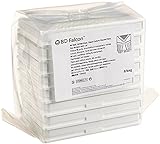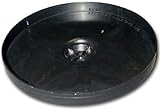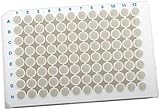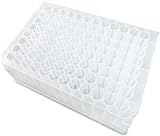Reviews Microplate Readers
Corning 3880 Polystyrene Flat Bottom 96 Well Half Area Black Microplate, Without Lid, Not Treated (Case of 100)
- Sterile, solid white 384-well polystyrene microplate has flat-bottom square shaped wells with a well volume of 112L and a recommended working volume of 20 to 80L.
- White wall plate is designed to reduce well-to-well crosstalk during luminescent assays.
- enhanced flatness provides low intra- and inter-plate CV's.
- suitable primarily for immobilization of large molecules, such as antibodies, that have large hydrophobic regions that can interact with the surface.
- Ideal for today's more sensitive assays and plate readers.
- conforms to standard microplate footprint and dimensions.
Check StockCorning Falcon 353377 Polystyrene 96 Well Flat Bottom TC-Treated Cell Culture Microplate with Lid, Sterile, 0.34cm² Cell Growth Area (Case of 32)
- Flat-bottom 96-well microplate with a lid for bottom-reading microplate readers and cell culture applications.
- Polystyrene body for durability and dimensional stability.
- Hydrophilic tissue-culture treated surface promotes growth and adhesion for a broad range of cell types.
- White wells with clear bases reduce well-to-well crosstalk, enhance luminescent signals, and reduce background for luminescent assays.
- Sterile for applications requiring sterility.
Check StockCorning 3635 Acrylic Copolymer Flat Bottom 96 Well UV-Transparent Clear Microplate, Without Lid (Case of 50)
- Solid white 96-well microplate has a flat bottom with a total well volume of 360L and a recommended working volume of 75 to 200L.
- Not treated (or medium binding) polystyrene surface is hydrophobic in nature and binds biomolecules through passive interactions.
- binding capacity of 100 to 200ng IgG/sq cm.
- Suitable primarily for the immobilization of large molecules, such as antibodies, that have large hydrophobic regions that can interact with the surface.
- White microplate enhances luminescent signals and have low background luminescence and fluorescence.
- conforms to standard microplate footprint and dimensions.
Check StockCorning Thermowell 6509 Polycarbonate Round Bottom 96 Well PCR Clear Microplate, Without Lid, Model P (Case of 25)
- Thermowell Model P 96-well PCR microplate is made from polycarbonate.
- Fits the most commonly used thermal cyclers.
- Clear, conical bottom wells have a round shape and a volume of 200L.
- Nonsterile microplate is not surface treated.
Check StockScientific Industries 146-6005-00 6\ Platform for Vortex-Genie 2 and Vortex-Genie Pulse Mixers
- Platform attachment for securely holding a foam insert on Scientific Industries Vortex-Genie 2 and Vortex-Genie Pulse mixers (sold separately).
- For use with Scientific Industries 504-0234-00 microtube insert, 504-0235-00 microplate insert, and SI-0510 two-tier microplate insert (all sold separately).
Check StockCorning 3912 Polystyrene Flat Bottom 96 Well Not Treated Solid White Microplate, Without Lid (Case of 100)
- Round bottomed microplate has a well volume of 250L.
- recommended working volume of 50 to 150L.
- Non-sterile, economical 96 well microplate is not surface treated.
- Can be used for solution-based assays, serial dilutions, and general storage applications.
Check Stock96-Well Full-Skirted PCR Plate, Ultra Thin Wall, Purple, 10 Plates/Unit
- Black 96-well half area microplate has clear flat-bottom round shaped wells with a total well volume of 190L and a recommended working volume of 25 to 125L.
- Not treated (or medium binding) polystyrene surface is hydrophobic in nature and binds biomolecules through passive interactions.
- binding capacity of 100 to 200ng IgG/sq cm.
- Suitable primarily for the immobilization of large molecules, such as antibodies, that have large hydrophobic regions that can interact with the surface.
- Designed to reduce well-to-well crosstalk during fluorescent assays.
- conforms to standard microplate footprint and dimensions.
Check StockCorning 3365 Polypropylene Round Bottom 96 Well Clear Microplate Without Lid (Case of 100)
- Black 96-well polystyrene microplate has clear flat bottom wells that are 60% thinner than conventional plates, resulting in lower background fluorescence and enabling readings down to 340nm.
- Nonsterile microplate has a total well volume of 360L and a recommended working volume of 75 to 200L.
- designed to reduce well-to-well crosstalk during fluorescent assays.
- Not treated (or medium binding) polystyrene surface is hydrophobic in nature and binds biomolecules through passive interactions.
- binding capacity of approximately 100 to 200ng IgG/sq cm.
- Suitable primarily for the immobilization of large molecules, such as antibodies, that have large hydrophobic regions that can interact with the surface.
Check Stock96-Well Deep Well Plates, Round Wells, Sterile,2.0mL,U Bottom,Deep Well Plates(Pack of 5)
- Non-sterile, 384-well clear polystyrene microplate has flat-bottom square shaped wells with a well volume of 112L and a recommended working volume of 20 to 80L.
- Not treated (or medium binding) polystyrene surface is hydrophobic in nature and binds biomolecules through passive interactions.
- Binding capacity of approximately 100 to 200ng IgG/sq cm.
- Conforms to standard microplate footprint and dimensions.
- suitable primarily for immobilization of large molecules, such as antibodies, that have large hydrophobic regions that can interact with the surface.
Check StockCorning BD Falcon 353918 Pro-Bind 96-Well Sterile Clear PS Assay MicroPlates, No Lids, CS50
- Solid black 96-well polystyrene microplate has flat bottom wells that are 60% thinner than conventional plates, resulting in lower background fluorescence and enabling readings down to 340nm.
- Nonsterile microplate has a total well volume of 360L and a recommended working volume of 75 to 200L.
- designed to reduce well-to-well crosstalk during fluorescent assays.
- Nonbinding (NBS) surface treatment creates a nonionic hydrophilic surface (polyethylene oxide-like) that minimizes molecular interactions.
- Ideal for reducing protein and nucleic acid binding at low concentrations, and increasing assay signal to noise.
Check Stock











